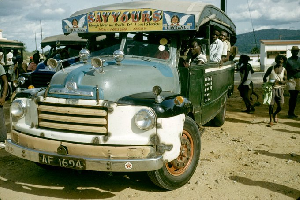Step outside your house and walk to the roadside. How many minutes will it take before you spot the familiar sight of a minibus, or ‘tro-tro,’ complete with its often impatient driver and eager 'mate'?
In Ghana, the term "tro-tro" has a fascinating origin. It comes from the Ga language word "tro," which means three pence—the fare charged during the colonial days. These mass transit vehicles, which charged passengers three pence per trip, have retained the name ever since.
The history of tro-tros dates back to the 1960s. Motor vehicles were first introduced in Ghana, then the British colony of the Gold Coast, in the early 20th century.
The wealthiest urban passengers drove private cars or hired taxis. The city's most mobile residents, travelling to and from the market, rode the municipal bus system approved by the Accra Town Council in 1927.
However, these British-style buses were designed solely for passenger transport, making it difficult for market women carrying goods.
Cocoa farmers preferred trucks, mainly made of wood and a few metal parts because they saw them as a good investment, allowing them to transport their produce directly to the coast.
Over time, many owners of these vehicles saw that they could make money transporting not just produce but people, especially market women to popular destinations.
The mammy lorries provided a better solution, transporting passengers and goods simultaneously.
The emergence of tro-tros in the late 1950s, first operated by the Ga driver Anane, extended the activities of colonial-era passenger lorries.
Post-independence leaders recognized tro-tros as lawful public transport, operating alongside municipal buses.
Tro-tros charged higher but set fares for travel within Accra's municipal boundaries.
Individual owners/operators often ran their vehicles like small businesses.
When the cost of maintaining the vehicle or buying petrol increased, so did the fares.
Today, the tro-tro system is an essential part of Ghanaian society, tro-tros are a melting pot of Ghanaian society.
Businessmen sit beside schoolchildren, the unemployed and marketwomen.
Since many Ghanaians can't afford taxis or cars, tro-tros have become a vital public service.
These minivans, which can carry up to twenty passengers, are as common on Ghanaian roads as potholes.
The prevalence of these vehicles has become a major source of employment in the country.
Unable to find formal sector jobs, young men often turn to the tro-tro sector for income.
Even pensioners drive tro-tros to supplement their small public pensions.
Businessmen import, modify and rent out these vehicles while they enjoy the passive income.
Using a tro-tro in Ghana is a puzzling yet easy practice, there's no schedule or map outlining routes; you simply wait by the roadside for the right one to come along.
Tro-tros don't have signs indicating their destinations, so passengers must decode the system themselves.
For instance, if you want to go to "Circle" (Accra's central bus station), you stand by the road and make a circle in the air with your finger. When a tro-tro operator (or "mate") sees you and yells "circle, circle, circle," you know it's heading your way.
The tro-tro stops, you hop on, and off you go. It's a simple system once you understand it, but frustrating if you don't.
For many, tro-tros are associated with poverty.
Passengers complain about the smell of the driver's assistant (or "mate"), that of other passengers, the vehicle's state, and the road's danger.
Government officials criticize tro-tro drivers for overspeeding and high fares, and newspapers are full of accident stories.
However, tro-tros are more than just a mode of transport; they are a vibrant part of Ghanaian culture,
They are a window to the resilience and spirit of the people who use them every day.
ID/BB
Watch a documentary on Uncle Ebo Whyte below:
General News of Saturday, 14 September 2024
Source: www.ghanaweb.com
The funny but fascinating origins of the tro-tro
The Uncle Ebo Whyte Story: From huge debts to losing his car and home, to ultimate success
0 seconds of 44 minutes, 56 secondsVolume 90%
Press shift question mark to access a list of keyboard shortcuts
Keyboard Shortcuts
Shortcuts Open/Close/ or ?
Play/PauseSPACE
Increase Volume↑
Decrease Volume↓
Seek Forward→
Seek Backward←
Captions On/Offc
Fullscreen/Exit Fullscreenf
Mute/Unmutem
Decrease Caption Size-
Increase Caption Size+ or =
Seek %0-9

















